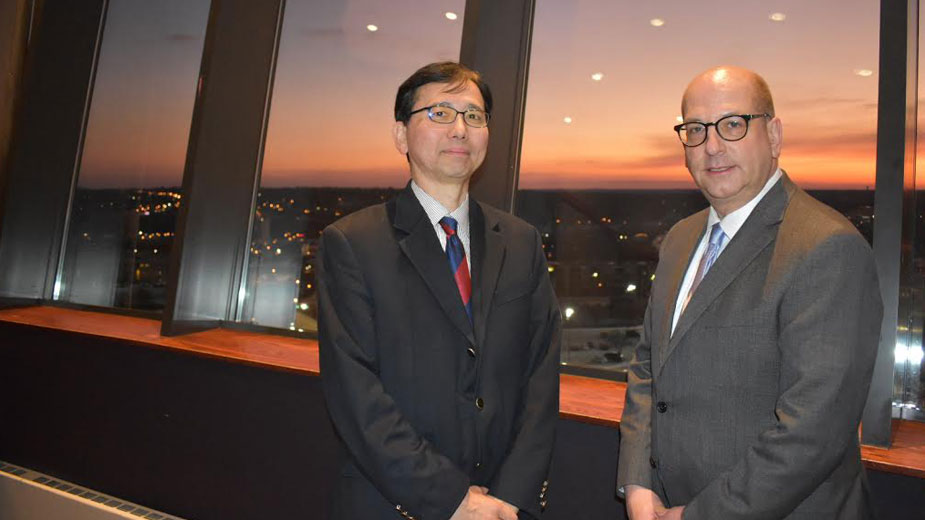Strong Ties Between YSU, Japan Can Lead to New Business
YOUNGSTOWN, Ohio – Strong relationships between universities and the business community can encourage Japanese investment and development in places like the Mahoning Valley.
There are already 500 Japanese business establishments in Ohio, said Noriyuki Shikata during a lecture Tuesday evening at Youngstown State University’s DeBartolo Stadium Club. Shikata is an associate with the program on U.S.-Japan Relations with the Weatherhead Center for International Affairs at Harvard University and a minister with the embassy of Japan.
The lecture, “U.S.-Japan Trade & Economic Relations in the Era of Trade Friction with China,” was sponsored by The Business Journal, Logos International Consulting and YSU’s Department of Politics and International Relations.
Japanese companies invest in the long term and work closely with local communities, Shikata said. They encountered challenges because of the gap in cultures in the early 1980s but mostly have successfully integrated, including in Ohio, where the focus has been on manufacturing, particularly auto production.
“Honda has been a driving force in Ohio since 1982,” he said. Today the manufacturer has 15,000 employees in the state.
Overall, Japanese firms created 75,000 jobs in Ohio in 2018, Shikata said. Across the United States, there are nearly 10,000 Japanese business establishments, and Japanese firms are responsible for creating 400,000 manufacturing jobs.
Relations between Japan and Ohio have “good potential,” particularly in areas including trade, investment, scientific cooperation and educational exchanges, he said. There are “notable efforts” underway to introduce electric-vehicle batteries in collaboration with YSU, and he further expressed interest in learning more about the Mahoning River Corridor initiative.
“Because Ohio hosts so many good universities, if there is a better partnership between higher education institutions and local businesses which turn their eyes to Japanese investors or Japanese students, that may lead to a better ecosystem,” he said.
“In terms of investment, they want to make sure that there are tight relationships between the university and the business community,” said Paul Sracic, professor and chairman of the politics and international relations department. “So the more that you can establish and market those relationships overseas, that’s something that the students who come to the university would experience and bring back with them.
“It’s one of the ways we can teach the world what we can offer,” he said.
Shikata pointed to a new exchange arrangement engineered by Sracic between YSU and Japan’s Waseda University.
“What I’m hoping is more information is generated to the Japanese people about Ohio,” Shikata said. “I hope that you come to Japan to tell us about Ohio and Youngstown.”
Bringing students to experience and understand the community makes it easier for Japanese companies to relocate here.
“The more foreign students we have here, the more multicultural that we can become in the Mahoning Valley, the more welcoming that we’ll seem to companies that want to relocate here,” Sracic said.
“What we have to do in the Mahoning Valley is be keenly aware of industry relationships, both domestic and foreign,” said Mike Hripko, associate vice president external affairs at YSU.
Hripko pointed to LG Chem, the South Korean firm that is partnering with General Motors Corp. on an electric-vehicle battery plant in Lordstown. LG also has a plant in Holland, Mich., which has several South Koreans in management and engineering.
“We have to be a community that is culturally sensitive and welcoming to Japanese or South Korean or to [other] cultures,” he said. “The more students we get to experience Asian business, industry and academia, the more well known the Mahoning Valley will be to those prospective companies and communities in Asia.”
Shikata also pointed to the benefits generated by U.S. assistance to Japan during “Operation Tomodachi,” following the 2011 earthquake and tsunami. The two-month, $90 million U.S. Armed Forces mission sent 24,000 servicemembers, 189 aircraft and 24 naval vessels to Japan.
“This is an issue of trust between Japan and the United States,” he said. The assistance reminded the Japanese of the strategic importance of its relationship with the United States.
Japan faces many of the same challenges in trading with China – now its largest trading partner – as the United States does, including on matters such as intellectual property and joint venture requirements, Shikata said.
As soon as a new edition of Japanese manga or anime is produced, he explained, a Chinese version appears almost immediately with no monetary compensation for the creators or the company that produced the original content.
What often happens under joint venture requirements is that the Japanese make the investment and train Chinese workers, but after a few years the Chinese companies become more independent.
The Phase I trade deal signed Jan. 15 between the United States and China is “good news” for Japan in the context of addressing issues such as intellectual property rights and new dispute mechanisms, Shikata said.
“They have come up with quite a robust chapter on intellectual property fights,” he said.
China is interested in improving IP protection as well because its economy has become more competitive, and Chinese companies now have their own intellectual properties to protect, such as Huawei Technologies’ 5G patents.
“We are hoping there will be progress in the second round of negotiations,” he added.
Both nations recognize the “rise and increasing power of China” so the U.S.-Japan relationship is important for both economic and strategic reasons, Sracic said.
“The top economies in the world are all going to be in the Asia-Pacific and Indo-Pacific region, and we need to have good relationships in those areas, not just by buying things but by selling things,” he continued. “We need to be able to export our products to these new Asian markets, so firming up this relationship is very important easing trade.”
Ohio has great trade relations with Japan, reported Mousa Kassis, director of the Export Assistance Network at the Ohio Small Business Development Center at YSU. More than 25 Japanese companies have investments in the 10-county region surrounding YSU.
“We hope to be able to do a little bit more with Japan, especially if they open their markets a little bit more for U.S. companies,” he added.
In May, he continued, a large Japanese delegation is expected to come to Ohio. His office is also working to sign local companies up for J-GoodTech, a business matching platform Japan provides to help U.S. companies partner with firms in Japan.
Pictured: Noriyuki Shikata, minister with the embassy of Japan, and Paul Sracic, chairman of YSU’s department of politics and international relations, explained how forging a tight bond with Japanese companies can bolster business development.
Copyright 2024 The Business Journal, Youngstown, Ohio.



